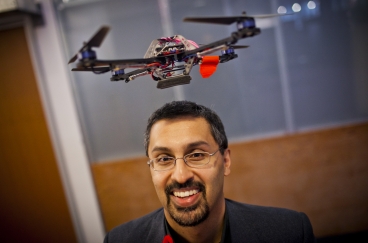Nicholas Roy, who is an associate professor at MIT for astronautics and aeronautics and his team of students are in the process of developing robots, which will have the ability to navigate through unknown territory.
 Nicholas Roy, an MIT associate professor of aeronautics and astronautics. Photo: Dominick Reuter
Nicholas Roy, an MIT associate professor of aeronautics and astronautics. Photo: Dominick Reuter
Such robots are suitable for dangerous and covert operations such as spying on enemy territory or navigating through nuclear disasters. These types of robots can save the use of manpower to a great extent and are convenient to use as they are small in size.
However the development of such robots presents certain challenges. Navigation in unknown territory involves complicated computational tasks and the robots need to have the capability to understand natural verbal languages. To address these problems Nicholas Roy and his team of students are in the process of developing micro-aerial vehicles (MAV), which are compact in size and can navigate independently without assistance from the global positioning system (GPS). While a majority of drones navigate with the help of GPS, the professor’s team are using quadrotors that are nothing but MAVs run by four small chopper blades and sensors and sensor processing systems, which will help the MAVs to navigate by themselves without the help of GPS. The sensors can range from laser range finders and cameras with the help of which these MAVs can move through obstacles and can locate their own positions. The team is also in the process of developing robots that can understand natural verbal language using mathematical models of human conversation. With the help of this technology the team has already built a robotic fork lift that can understand verbal commands.